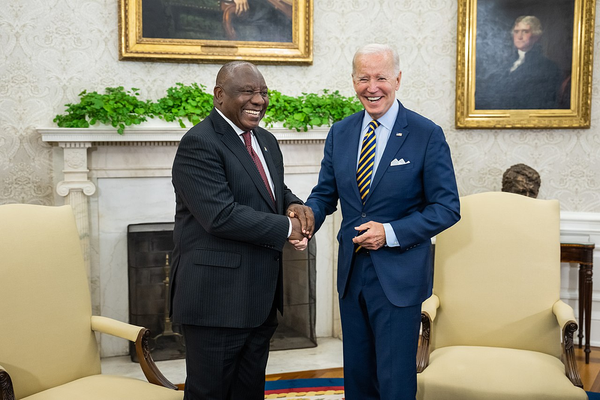DOMINION: Man’s Primordial Telos
The early man learned ‘ownership’ early on. He owned land, animals, and even other men, he literarily appropriated those things to himself. He had inadvertently discovered an existential telos: dominion! The quest to dominate led him to create families, communities, kingdoms, and empires.

In the beginning
From the dawn of time, man has always sought to dominate, take charge, or subdue. Of course, the man, in this case, refers to the human species.
Depending on the account you believe; man either evolved from apes or fish-like creatures that braved the sandy beaches of early Earth, all these; occurring millions of years after the Big Bang. Another account has it that man evolved from the flies and worms of Pan-ku's dead body after the Chinese God of creation spent eighteen thousand years creating the sun, the moon, and the stars.
Or the account of the God of Israel who said in the Bible book of Genesis 1:29 “let us make man in our image, after our likeness”, he then proceeded to breathe life into the first man; Adam, whom he had fashioned out of clay. In like manner, he fashioned the woman from Adams’ ribs. Or do we consider the creation of man by Obalata, the Yoruba deity who created the earth with sand he poured on the surface of the vast waters as he dangled from a golden chain he used to descend from heaven, he then proceeded to create man from clay to populate the land which later became known as Ile-Ife (now in present-day Osun State, Nigeria).
The stories of creation tell a tale when you take a broader look at a number of them at the same time. Humans have all tried to put their own unique spin on that story for centuries. We have sought to establish our narrative; either by cultural heritage, spiritual epiphany, or educational inclination, as the correct account of creation. In other words, we have sort to dominate through the stories we tell about the origin of man.

Dominance
After humans came into being, he went ahead to dominate his environment. As the early man started to acclimatize, he sought out materials to make loincloths in order to protect himself from the elements (and hide his nakedness according to the Hebrew Bible in Genesis 3:9) and he also hewed crude tools from the unforgiving earth around him. He built crude abodes and started to hunt game.
I sometimes wonder why most of the other stories and legends of creation suggest (however loosely) that man's intelligence and physical form, from inception, had blossomed beyond that of sciences Early-man. For instance, in the Hebrew scriptures; Adam named all the animals that were created by God in the book of Genesis while his scientific counterpart roamed the earth as a crude version of modern-day man. The basic types of creation myths such as;
Creation from chaos. Examples of this are the Panku Creation myth - Chinese myth, and Genesis creation myth: Christianity, Islam, and Judaism — Predominantly Middle Eastern regions, Mande creation myth — Southern Mali
Earth Diver (The Yoruba Creation myth, Cherokee creation myth — South America, Ob-Ugric creation myth — Western Siberia) Emergence (Maya creation of the world myth, Zuni creation myth — Southern America, Hopi creation myth )
Ex Nihilo (ancient Egyptian creation myth, Mbombo creation myth — Congo, Ngai creation myth — Kenya)
World creation (Greek cosmological myth, Heliopolis creation myth, Kumulipo creation myth — Hawaii)
Divine Twins (Proto-Indo-European mythology: Proto-Indo-European mythology is the body of myths and stories associated with the Proto-Indo-Europeans) (Wikipedia)
All hold that humans, after creation, were brilliant enough to build magnificent edifices and monuments to God and man. They also apparently did not evolve from fish or apes. In these myths, the advent of man on earth was a direct result of a series of events designed (by a higher being or a “prime” man or men) to bring about the existence of mankind. They all have one thing in common; they are myths, mostly symbolic stories tied into the earliest account of the advent of the proponents.
However, the scientific account of the advent of man is different in that its intent is to discover our origin through systematic research. But it too falls short of the ultimate explanation simply because of the enormity of the work, the eons that have gone by, and the shortage of hard evidence. It, however, enjoys the privilege of being the most widely taught narrative.
Once the early man was able to build an abode for himself, was able to form a family, procreate and populate the land. He developed a taste and a pattern for food and feeding. He developed a style of clothing and he sharpened his mastery of sound and communication. He also cultivated a culture for himself and mastered the art of leadership and management.
The early man learned ‘ownership’ early on. He owned land, animals, and even other men, he literarily appropriated those things to himself. He had inadvertently discovered an existential telos: dominion! The quest to dominate led him to create families, communities, kingdoms, and empires. In all the forms of the early community, there were patriarchs, kings, queens, or leaders who literarily owned the land and considered everyone else subjects in their domain.

Conflict of interest
As time went on, the man started to dominate more lands and people, he reached out to the seas and conquered the waves which in turn carried him to more lands. The man had always had a proclivity for violence, as such, disputes arose over many things including ownership of other lands and subjugation of ‘other’ people. Genghis Khan (1162–1227) ruled the Mongolian empire in the east, the largest land empire known to man. Sundiata Keita established the Malian empire in West Africa, one of the largest in the region, he is said to have reigned from 1235–1255 and was known as the Lion King.
The Chavín culture is an extinct, prehistoric civilization, named for Chavín de Huantar, the principal archaeological site at which its artifacts have been found. The culture developed in the northern Andean highlands of Peru from 900 BCE to 200 BCE. It extended its influence to other civilizations along the coast. Not much is really known about this South American civilization, but the following are certain: the civilization must have had a ruler, must have been started by someone or a group of people, and must have had its own myth about the origin of man and must have had its fair share of violence, conflicts, and wars, an attestation to the dominative nature of man.
The three examples from three major continents in the world show that the yearnings of men are largely the same: they all seek to build and dominate among other things! I dare say this yearning is primordial in nature, the earliest records show the quest to dominate the land, to farm or till the ground. The expression of this yearning manifests in different ways in each individual, yet the pattern is there. From the loincloths and crude instruments of early man to the architectural masterpieces of renascence to the great empires of old, all of them were created and owned by people who considered themselves dominant in each scenario.
When the building of terrestrial empires had been mastered across the world, the quest to build a world empire was kindled. Alexander the Great, Napoleon Bonaparte, and Adolf Hitler were some of those who tried to establish a world empire. World Wars One and Two had such profound effects on the world that the two wars altered the path and sociopolitical and economic systems of the world. Countries and their territorial integrity became sacrosanct, and international bodies like the Bretton Woods institution (The World Bank and The International Monetary Funds) were created.

A new order of things
The world had entered a new era where the domination of others by force was no longer tolerable or fashionable. The rules had been changed by those who emerged as victors of the Second World War, even though the desire still remains! Naturally, humans in their ingenuity found other means. America established the Dollar as the de facto world currency, the United Kingdom maintains diplomatic influence across the world;
China, France, Russia, The United Kingdom, and The United States are often referred to as great powers by academics due to “their political and economic dominance of the global arena”. These five nations are the only states to have permanent seats with veto power on the UN Security Council. Great power is a nation or state that, through its great economic, political, and military strength, is able to exert power and influence over not only its own region of the world but beyond others. In a modern context, recognized great powers came about first in Europe during the post-Napoleonic era. (Wikipedia)
These countries have several things in common including but not limited to; a global adoption of their languages (China is the exception here, even though its influence in the language is beginning to grow across the world), a global dominance of their currencies, and overbearing influence in world politics. The dominance of world trade. They also have considerable military might and lead innovation in military and technological advancements. Vestiges of empires of old.
The quest to dominate has evolved over the years; Jeff Bezos of Amazon, late Steve Jobs of Apple, Aliko Dangote of Dangote Group, Folorunso Alakija of Famfa Oil, Oprah Winfrey of OWN media, Mark Zuckerberg of Facebook, and a host of others may not have built ‘government’ empires but they have all succeeded in building business empires, this points to a singular fact; the desire to dominate is ever present in humans. The expression of the desire is however unique to each individual and it is at that individual level the realization of this primordial desire to dominate must be had.
The desire must be regulated or managed in order to live harmoniously with other humans and the environment. In instances when the desire consumed powerful individuals; world domination, accumulation of wealth, land, and capital by any means possible become the order of the day. With the advent of the Internet, it has become even more possible for many more people to create and dominate. Creativity and dominion are tightly related and the ultimate form of dominion is to create; what manner of creation is there that is greater than to remake another man in your own image?
Remember the June/July 2018 FIFA World Cup, France won amid great fanfare. The less talked about part of that win is the fact that there were more immigrants (that have become politically charged in recent times) on that team than ‘native’ French men if that isn’t remaking a man in your image I don’t know what is. As I pointed out earlier, the quest is primordial in nature; it is not necessarily evil in itself, it is the individual’s expression of that desire that would be judged either good or evil. Going into the future: mankind’s ability to build and dominate great enterprises and ventures has been and would be greatly enhanced by technology.
As an individual, know that the quest to build and dominate isn’t evil, it’s what you would do to satisfy the drive that matters, and for the sake of humanity we all need to recognize this drive and control it, the survival of the world depends on human interaction which of course depends on how each individual manages this urge.

If you enjoyed this article, kindly subscribe to our weekly newsletter: "News From Around The Motherland," to stay updated on opinion articles and in-depth explorations of diverse African subjects. Thanks for reading.




